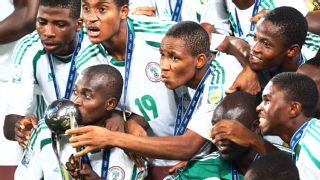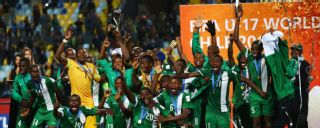|
When Nigeria's U-17 boys outscored Ghana 3-1 in a penalty shootout to qualify for the U-17 Africa Cup of Nations on Saturday, few would have taken note of a small but very important squad detail. Five members of the squad were graduates of the NFF U-15 team, who also progressed from the NFF U-13 team. There were also graduates of the NPFL/La Liga U-15 Promises tournament. A few short months ago, these players were in Morocco playing friendly matches. Both programs were organised with the objective of creating a viable and continuous conveyor belt of genuine, high-quality talent for the national teams. Success in Niamey was vindication of that approach. Ghana's Isaaku had just missed his spot kick in the penalty shootout - his third such miss for the Black Starlets. As Nigeria's Muhammad Ibrahim stepped up to the spot, it was up to him to guarantee victory, the title, and progression to the U-17 AFCON for this young Nigerian side. Nerveless, the youngster drilled in his kick, took the score to 3-1 and it was time to pop the fizz. The Golden Eaglets are on their way to the African championships, where they will compete for one of four tickets to the FIFA U-17 World Cup. Normally, the West African giants should get the job done. Nigeria are record winners of the FIFA tournament, their five titles unmatched by any other country. They also hold the record for the most appearances - eight - at the African championships, and qualifying for one more should really be considered par for the course. There are reasons however, why this time things might be different. For one, CAF recently changed its qualifying format to a regional qualifying series, meaning each of its six zones could only produce one qualifier, with the exception of the hosts' and the defending champions' zones, who have two each. To that extent, winning Saturday's match in Abidjan was mighty important for Nigeria to get to the African championships.  However, there was a subtler, and surely more important reason for celebration. In the midst of the goings on within and around Nigerian football, a shift has begun to take hold, one that has largely flown under the radar, but which could prove vital for Nigeria's future football fortunes. Since those heady days of the mid to late 90s, Nigeria have seen a steady decline in the quality of talent coming through the ranks. It's true that the country won the U-17 world title three times in the 2000s, but fans have been treated, largely, to the same scattergun approach with little or no clearly defined strategy. In recent years, there has been a shift. Under the administration of Sani Lulu Abdullahi, the NFF set up the national U-13 program, with the objective not just of identifying players early, but of grooming them for promotion through the age-grade ranks all the way to the Super Eagles. That program was given priority prominence under the current administration, with direct oversight provided by NFF Vice President Seyi Akinwunmi. Emphasis has silently shifted from winning trophies, to more rounded football education for youngsters, Akinwunmi tells KweséESPN. "We are proud that we are beginning to change the mindset of Nigerians to understand that youth football development should be judged on development and not necessarily on the number of trophies won," he began. Prominent products of that program are Kelechi Iheanacho and Francis Uzoho, both of whom were in Nigeria's squad at the 2018 World Cup in Russia. As a matter of fact, that Super Eagles team to Russia had 13 youth-team graduates, the highest ever such number since the Super Eagles first qualified for the World Cup in 1994. Two years ago, under a partnership with La Liga, the NPFL also instituted the U-15 Promises tournament, which should also contribute to the nation's youth development. "We do consider [the partnership] a success, indeed a great success," Akinwunmi added. "Not only because the boys have made the squad, but also because it clearly gives hope to the next set coming behind them that they will not be 'lost' in the crowd of 'screening' of the thousands of players that hitherto took place prior to the selection of our U-17 squad. "We are hopeful that the next U-17 squad would come exclusively -- or almost exclusively -- from NFF-organised or recognised youth tournaments and programs." One of the biggest challenges for the NFF has been the influence of agents, enabled by parents trying to get their children a big professional contract as soon as possible. Akinwunmi vows that the NFF will continue to tackle this challenge. "This is the biggest challenge that we have given the indigence of many of the parents of these talented footballers who are still minors in the eyes of football," he continued. "We will continue to counsel the players and their parents, but we hold the view that once you play for any of the Nigerian youth teams then you should 'belong' to the country for those youth years since that is what brought you to the limelight. "It is a delicate legal issue and we are working gradually on a policy along those lines," he continued. "However, we are always mindful of our guidance and mentorship role in leading them along the path to successful careers." NFF president Amaju Pinnick has already promised to take the boys on training tours to Qatar and Jordan ahead of next year's African championships. Qualification for the World Cup will of course be an important focus, but continued development would represent even greater success
|

